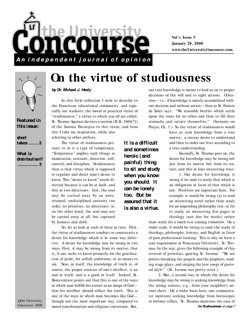Computers and liberal learning
by Ben Brown
I would like to thank Anne Schmiesing for her comments furthering the discussion of the nature of a liberal arts education. I readily grant her distinction between the humanities and the liberal arts, and would modify my earlier comments accordingly.
Concerning the place of computer science in the liberal arts, Mrs. Schmiesing seems to say that basic computer use skills should have a place therein, based on the analogy with writing as a means of communication in the tri/quadrivium. This analogy, however, does not work the way she would like it to, because insofar as writing was a prerequisite, it does not pertain to a liberal arts education. And insofar as a liberal arts education does teach writing, it does so under the aspect of teaching clear and accurate thinking and the expression thereof. In order to make the analogy hold, then, Mrs. Schmiesing would have to show that learning how to use a word processor, email, and the internet is something which fosters clear and accurate thinking and expression. I don’t think that anyone is going to be able to show such a thing, and so I assert once again, that computer skills do not fall under the umbrella of the liberal arts, despite the fact that anyone living today should have such skills.
I would, however, like to take this opportunity to briefly mention my thought that certain aspects, parts, and sub-disciplines of computer science do pertain to a liberal arts education, namely those parts which actually do develop one’s thinking. Such parts include algorithmic thinking and problem solving as learned through programming, an understanding of symbol systems and logic, computational linguistics, computing theory, and others.
Finally, if Mrs. Schmiesing means by a poor liberal arts education the kind of relativist, deconstructionist stuff that is often done these days, then I am in complete agreement with her that we can hardly say that the student’s intellect is cultivated. I would even go one step further, though, and say that it is really not even “developed” or “grown,” to use Mrs. Schmiesing’s terms. In fact, to answer her question, I mean by cultivated just what Newman meant, namely developed, perfected (not absolutely, of course), fulfilled and actualized.
If, however, she means an education that is not explicitly Christian (which is what the previous debate has been more focused on), then she is going to have to show how the incompleteness therein means that we cannot call such an intellect cultivated or perfected (to the requisite degree).
To say that one’s intellect must be absolutely perfected in order to say that the person is educated is to relegate the term education to meaninglessness, since no one in the history of the world has attained such a perfection. To use Mrs. Schmiesing’s analogy, there neither is, was, nor ever will be an intellect so cultivated that it is free from all weeds. The question is whether the garden is fundamentally oriented towards growing food and growing it well, not how many weeds there are. Many of the best minds had some pretty towering weeds. I have the sense in the end, however, that I have somewhat missed this last point of Mrs. Schmiesing’s, and if so, I hope that she will write back to clarify.
Ben Brown, Contributing Editor


